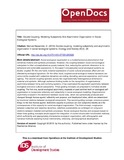| dc.contributor.author | Manuel-Navarrete, David | |
| dc.date.accessioned | 2018-07-31T11:59:40Z | |
| dc.date.available | 2018-07-31T11:59:40Z | |
| dc.date.issued | 2015-01-01 | |
| dc.identifier.citation | Manuel-Navarrete, D. (2015) Double coupling: modeling subjectivity and asymmetric organization in social-ecological systems. Ecology and Society 20(3): 26 | en |
| dc.identifier.uri | https://opendocs.ids.ac.uk/opendocs/handle/20.500.12413/13958 | |
| dc.description.abstract | Social-ecological organization is a multidimensional phenomenon that combines material and symbolic processes. However, the coupling between social and ecological subsystem is often conceptualized as purely material, thus reducing the symbolic dimension to its behavioral and actionable expressions. In this paper I conceptualize social-ecological systems as doubly coupled. On the one hand, material expressions of socio-cultural processes affect and are affected by ecological dynamics. On the other hand, coupled social-ecological material dynamics are concurrently coupled with subjective dynamics via coding, decoding, personal experience, and human agency. This second coupling operates across two organizationally heterogeneous dimensions: material and symbolic. Although resilience thinking builds on the recognition of organizational asymmetry between living and nonliving systems, it has overlooked the equivalent asymmetry between ecological and socio-cultural subsystems. Three guiding concepts are proposed to formalize double coupling. The first one, social-ecological asymmetry, expands on past seminal work on ecological self-organization to incorporate reflexivity and subjectivity in social-ecological modeling. Organizational asymmetry is based in the distinction between social rules, which are symbolically produced and changed through human agents’ reflexivity and purpose, and biophysical rules, which are determined by functional relations between ecological components. The second guiding concept, conscious power, brings to the fore human agents’ distinctive capacity to produce our own subjective identity and the consequences of this capacity for social-ecological organization. The third concept, congruence between subjective and objective dynamics, redefines sustainability as contingent on congruent relations between material and symbolic processes. Social-ecological theories and analyses based on these three guiding concepts would support the integration of current structuralist-functionalist methods, which sufficiently and appropriately characterize ecological organization, with ethnographic and narrative methods exploring human intentionality, reflexivity, and biographical development. | en |
| dc.language.iso | en | en |
| dc.publisher | The Resilience Alliance | en |
| dc.rights.uri | http://creativecommons.org/licenses/by-nc/4.0/ | en |
| dc.subject | Environment | en |
| dc.subject | Science and Society | en |
| dc.subject | Social Protection | en |
| dc.title | Double Coupling: Modeling Subjectivity And Asymmetric Organization In Social-Ecological Systems | en |
| dc.type | Article | en |
| dc.rights.holder | Copyright © 2015 by the author(s). Published under license by the Resilience Alliance. | en |
| dc.identifier.externaluri | https://steps-centre.org/publication/double-coupling-modeling-subjectivity-asymmetric-organization-social-ecological-systems/ | en |
| dc.identifier.doi | 10.5751/ES-07720-200326 | |
| rioxxterms.funder | Default funder | en |
| rioxxterms.identifier.project | Default project | en |
| rioxxterms.version | VoR | en |
| rioxxterms.versionofrecord | http://dx.doi.org/10.5751/ES-07720-200326 | en |
| rioxxterms.funder.project | 9ce4e4dc-26e9-4d78-96e9-15e4dcac0642 | en |


